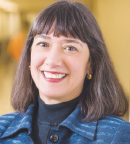
Monica M. Bertagnolli, MD, FACS, FASCO
This past year, I have traveled thousands of miles across the United States meeting with ASCO members and their patients, focusing on members who care for patients in particularly challenging settings. While I am not surprised by the extraordinary work our members are doing in every region of the country, I have a renewed sense of appreciation for how much they are able to accomplish and how valuable they are to their communities. The theme of my Presidential year is “Caring for Every Patient, Learning From Every Patient,” and I witnessed how meaningful those words are, especially for our members who work in settings where care for the underserved is a major goal.
Knowledge and understanding are essential to eliminating inequality in cancer care, and the first step must be increased inclusion of underrepresented populations in clinical research. The most definitive research data comes from prospective clinical trials, which unfortunately only involve only approximately 3% to 5% of cancer patients. We estimate that we lack the knowledge generated through clinical research data on the great majority of patients, and this deficit is greater for many who are cared for in the community setting, especially for underrepresented minority patients, those living in rural settings, the elderly, and those without health insurance.
Listening and Learning
One of the most inspiring features of my travels throughout the country involved visiting ASCO members who bring National Cancer Institute (NCI)-funded clinical trials to their patients. Finding the resources required to conduct research can be almost impossible in clinical care environments where physicians are struggling to serve patients who are underinsured or undocumented. NCI funding makes it possible for us to learn how to better meet the needs of underserved communities.
Knowledge and understanding are essential to eliminating inequality in cancer care, but one of the most significant disparities is a lack of knowledge about patients.— Monica M. Bertagnolli, MD, FACS, FASCO
Tweet this quote
For example, I visited Ohio’s Appalachian counties and met with ASCO members Srini Vasan, MD, a radiation oncologist, and Utpal Bhanja, MD, a medical oncologist, at the Strecker Cancer Center at Marietta Memorial Hospital in Marietta, Ohio. Strecker Cancer Center is a component of the NCI’s Community Oncology Research Program (NCORP) and, through NCI funding, makes cancer control and treatment clinical trials available to the region.
I also traveled to Laredo, Texas, where ASCO member Gary W. Unzeitig, MD, a surgical oncologist, is working with the Gateway Community Health Center to care for patients who are facing serious socioeconomic barriers to cancer care. As a leader in the NCI’s National Clinical Trials Network (NCTN), Dr. Unzeitig is dedicated to seeing that clinical trials involve both underserved and Latino/Hispanic participants, including patients in studies without limits pertaining to their insurance or citizenship status.
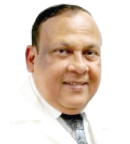
Utpal Bhanja, MD

Gary W. Unzeitig, MD
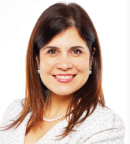
Marcia Cruz-Correa, MD, PhD
At the University of Puerto Rico Comprehensive Cancer Center in San Juan, I spoke with Marcia Cruz-Correa, MD, PhD, who leads the center’s gastrointestinal oncology program, and met with a number of her patients, who stressed the central role that the cancer center plays in their community. Even with the great challenges introduced following Hurricane Maria, they take particular pride in being part of a program that includes NCI-funded clinical research.
In Rapid City, South Dakota, I met with Daniel G. Petereit, MD, a radiation oncologist who works with leaders of the Great Plains Native American tribes to bring cancer control and screening trials to the Pine Ridge Indian Reservation. In Kyle, South Dakota, a small community within the Pine Ridge Indian Reservation, I met with a member of a local cancer support group who told me how disappointed he was that Dr. Petereit did not have a trial open for his particular cancer—a testament to the value of research to the region.
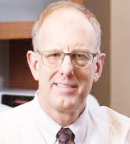
Daniel G. Petereit, MD
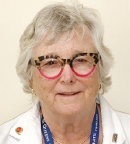
M. Margaret Kemeny, MD
Finally, I visited the Queens Cancer Center at Queens Hospital/Mt. Sinai Services in Jamaica, New York, where M. Margaret Kemeny, MD, Director of the Queens Cancer Center, introduced me to the center’s cancer care and clinical research program. The center is staffed by a very talented and diverse team of professionals who meet the needs of a community in which 108 different languages are spoken. I spoke with one patient who is enrolled in a breast cancer clinical trial. She explained that she would not be able to participate in the trial without the food bank organized by Dr. Kemeny’s team. This illustrated an important theme throughout all of these meetings: that caring for and learning from cancer patients demands a response to all of their essential needs, not just cancer treatment.
I have been involved with NCI-supported clinical trials my entire career, and through working in the NCTN, I know many of the individuals making outstanding contributions to understanding how patients’ social determinants relate to cancer and affect outcomes. However, it was not until I made these trips, visited these clinics, and met with many patients that I truly appreciated the importance of these trials to ASCO members and their communities.
Making Progress in Cancer Care
Research can produce interventions that make a difference in the treatment of cancer on a large scale, as outlined in ASCO’s recent Clinical Cancer Advances 2019 report.1 In the report, we detail the extraordinary progress being made in understanding, preventing, diagnosing, and treating cancer. The result of decades-long dedicated research has led to unprecedented numbers of cancer survivors—nearly 17 million this year, and that number is projected to grow to over 26 million by 2040.2 Moreover, this year’s Advance of the Year, Progress in Treating Rare Cancers, reflects the impact these efforts are having on five rare cancers: anaplastic thyroid cancer; desmoid tumors; foregut, midgut, and hindgut neuroendocrine tumors; HER2-positive uterine serous carcinoma; and tenosynovial giant cell tumors.
NCI funding makes it possible for us to learn how to better meet the needs of underserved communities.— Monica M. Bertagnolli, MD, FACS, FASCO
Tweet this quote
Although a declining mortality rate from cancer in the United States indicates that we are making progress in improving treatment outcomes, we still have much work to do to broaden this success to all citizens. An important path to achieving this goal is to increase participation in clinical trials, especially participation by underserved and minority patients.
This year, for the first time, the Clinical Cancer Advances report highlights nine research areas ASCO has identified to help accelerate progress against cancer, address an unmet need, or fill a knowledge gap critical to improving patient care and outcomes. They include, in no particular order:
- Identifying strategies that better predict response to immunotherapies
- Better defining patient populations that benefit from postoperative therapy
- Translating innovations in cellular therapies to solid tumors
- Optimizing care for older adults with cancer
- Increasing equitable access to cancer clinical trials
- Reducing the long-term consequences of cancer treatment
- Increasing precision medicine research and treatment approaches in pediatric cancers
- Reducing obesity’s impact on cancer incidence and outcomes
- Identifying strategies to detect and treat premalignant lesions.
Working throughout a diverse range of communities, ASCO members will continue to find solutions that ensure all patients benefit from treatment advances and that millions of cancer survivors will be able to live long, high-quality lives. Here are some ways ASCO is helping accomplish those goals.
To curate the growing amount of real-world patient data and make this resource accessible to oncologists around the world, ASCO continues to expand its big-data platform CancerLinQ®. When fully developed, CancerLinQ will allow oncology providers to analyze patients’ medical records to uncover disease patterns and treatment effectiveness, measured against that of their peers and recommended treatment guidelines, and use these insights to improve the quality of patient care. Currently, the CancerLinQ database contains 900,000 patient records and is still growing, making it one of the largest, most diverse, and most comprehensive data sets of its kind.
Ensuring High-Quality Care for All Patients
Making sure that every patient has access to high-quality cancer care is central to ASCO’s mission of conquering cancer through research, education, and promotion of the highest-quality patient care, as well as to its vision of promoting a world where cancer is prevented or cured and every survivor is healthy. A large number of ASCO initiatives are devoted to accomplishing these goals, including Cancer.Net, ASCO’s website for survivors and their family members and caregivers. Cancer.Net provides evidence-based information on accessing the best possible care.
Making sure that every patient has access to high-quality cancer care is central to ASCO’s mission of conquering cancer….— Monica M. Bertagnolli, MD, FACS, FASCO
Tweet this quote
ASCO is also working to increase oncology workforce diversity through its Strategic Plan for Increasing Racial and Ethnic Diversity in the Oncology Workforce.3 Developing a physician workforce that reflects the diversity of the patient population we serve is a critical step in reducing health disparities in minority patients—particularly African American patients, who have the highest mortality rates for the most common cancers in the United States. The premise underlying this is that one path to eliminating disparities in cancer care involves addressing disparities in the racial and ethnic makeup of the care providers.
ASCO’s numerous advocacy efforts aim to influence policies at the federal and state levels to increase access to high-quality cancer care, regardless of a patient’s zip code, race or ethnicity, and ability to pay for that care. One example of this commitment to patients is ASCO’s support of the Clinical Treatment Act, a bipartisan bill before Congress that would require Medicaid to cover routine costs of care for patients with life-threatening conditions who are enrolled in clinical trials. Last year, ASCO also published a policy statement that addresses the financial barriers to patient participation in clinical trials and provides recommendations for overcoming those financial barriers.4
Another example is the joint position statement released in 2017 by ASCO, the American Association for Cancer Research, and the NCI. This document details a strategy to guide the future of cancer-related health disparities research by fostering cooperation across the cancer research community, ensuring that all patients—no matter their social demographics, socioeconomic status, or where they live—benefit from cancer research.5
Improving Oncology Care Globally
Approximately one-third of ASCO members practice outside the United States. Of these members, one-quarter practice in low- and middle-income resource settings. ASCO’s current strategic plan includes efforts to increase the quality of cancer care globally. To achieve this goal, ASCO International provides a wide range of programs that engage members around the world. In particular, ASCO’s Quality Oncology Practice Initiative (QOPI®) and Quality Training Program are increasingly being utilized to support the practices of our international members.
ASCO’s current strategic plan includes efforts to increase the quality of cancer care globally.— Monica M. Bertagnolli, MD, FACS, FASCO
Tweet this quote
In addition, we are excited to launch our first international meeting—Breakthrough: A Global Summit for Oncology Innovators—which will be held in Bangkok, Thailand, October 11 to 13, 2019. This new meeting will be focused on the intersection of medicine, scientific discovery, and innovations in technology. It will be unlike any previous ASCO event and will bring together leaders in medicine and technology to address the challenges facing the practice of oncology now and in the future. Future Breakthrough meetings will be held in different cities throughout Asia, where significant advances in technology are rapidly emerging. To sign up to receive additional information about Breakthrough, go to www.asco.org/subscribe-meeting-and-symposia-updates.
Looking Toward the Future
I want to thank all of our members, members of ASCO’s Board, executive leadership, and professional staff for making my first 2 years on the ASCO leadership team so fulfilling. I particularly want to thank the generous hosts of my many travels this year. You have all taught me so much, and I am in awe of your talent, compassion, and dedication. Finally, I would like to thank my many colleagues throughout the NCTN and NCORP who, at considerable sacrifice, make sure that all cancer patients, particularly those who belong to populations with special challenges, are included in cancer clinical research.
I’m looking forward to my final 2 years as an ASCO volunteer leader and to making our goal of “Caring for Every Patient, Learning From Every Patient” a greater reality. ■
Dr. Bertagnolli is President of ASCO, a member of the Division of Surgical Oncology at Dana-Farber/Brigham and Women’s Cancer Center, and Professor of Surgery at Harvard Medical School.
Disclaimer: This commentary represents the views of the author and may not necessarily reflect the views of ASCO or The ASCO Post.
DISCLOSURE: Dr. Bertagnolli has a leadership role in Leap Therapeutics; is a consultant/advisor with Syntimmune and Syntalogic; has received institutional research funding from AbbVie, Agenus, Astellas Pharma, AstraZeneca, Breast Cancer Research Foundation, Bristol-Myers Squibb, Celgene, Complion, Exelixis, Genentech, GHI Pharma, Gilead Sciences, GlaxoSmithKline, Incyte, Jazz Pharmaceuticals, Lilly, Matrex, Mayo Clinic, MGH, Millennium Pharmaceuticals, Novartis, Patient-Centered Outcomes Research Institute, Pfizer, Robert Wood Johnson Foundation, Sagerock Advisors, Taiho Pharmaceutical, Bayer Health, Eisai, Leidos, Lexicon, Merck, Pharmacyclics, Takeda, Tesaro, Baxalita, Sanofi, Teva, Janssen, and Merck.
REFERENCES
1. Pal SK, et al: Clinical cancer advances 2019. J Clin Oncol 37:834-849, 2019.
2. National Cancer Institute Office of Cancer Survivorship: Statistics. Available at cancercontrol.cancer.gov/ocs/statistics/statistics.html. Accessed April 30, 2019.
3. ASCO releases strategic plan to increase racial and ethnic diversity in oncology workforce. May 1, 2017. Available at www.asco.org/about-asco/press-center/news-releases/asco-releases-strategic-plan-increase-racial-and-ethnic. Accessed April 30, 2019.
4. Winkfield KM, et al: Addressing financial barriers to patient participation in clinical trials: ASCO Policy Statement. J Clin Oncol 36:3331-3339, 2018.
5. Leading national cancer groups release joint statement to chart the future of cancer health disparities research. July 24, 2017. Available at www.asco.org/about-asco/press-center/news-releases/leading-national-cancer-groups-release-joint-statement-chart. Accessed April 30, 2019.

